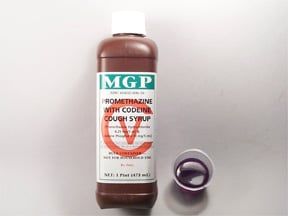
Promethazine-codeine Coupons & Savings Card – Discount Prices from $10.32
Promethazine with codeine is a combination medication designed to alleviate symptoms associated with respiratory infections, allergies, or the common cold, such as cough, runny nose, and sneezing. It combines promethazine, an antihistamine, which eases watery and itchy eyes, runny nose, and sneezing, with codeine, an opioid cough suppressant that reduces the urge to cough by acting on a specific part of the brain.
This medication is intended for short-term use in adults, as it can become habit-forming. It is available as an oral solution and should be taken every 4 to 6 hours. Patients are advised against consuming alcohol while on this medication due to the risk of slowed breathing.
Common side effects may include drowsiness, dizziness, and dry mouth. It is crucial to consult a healthcare professional to discuss the risks and benefits before use, as opioid cough suppressants can pose serious risks, particularly for children under 18, who are at higher risk for severe side effects, including breathing difficulties.
It is important to note that cough-and-cold products do not cure colds, and coughs from a common cold may not require medication. Consider alternative ways to relieve symptoms, such as staying hydrated, using a humidifier, or applying saline nose drops. Always seek professional medical advice before starting any new medication.
Our coupons are free to use. Before paying, show the pharmacist your Promethazine-codeine savings card to get your free discount. Use our filters below to edit the prescription box to match your needs. The Promethazine-codeine prices will update based on your prescription needs. Above our Promethazine-codeine coupons, you can change your location to see pharmacy prices and costs in other areas. We're here to help you buy Promethazine-codeine at the lowest price with our prescription discount card.
My prescription
Edit
118ML of 6.25-10MG/5ML, Promethazine-codeine (1 Bottle)
Select pharmacy

CVS
$26.19
COUPON PRICE
Walgreens
$10.32
COUPON PRICE
Albertsons
$20.64
COUPON PRICEPromethazine-codeine savings card
Show this card to your pharmacist
Walgreens
$10.32
BIN
ID
PCN
GRP
019876
LHE73EA88A
CHIPPO
LHX
Powered by
Promethazine with codeine is a combination medication designed to alleviate symptoms associated with respiratory infections, allergies, or the common cold, such as cough, runny nose, and sneezing. It combines promethazine, an antihistamine, which eases watery and itchy eyes, runny nose, and sneezing, with codeine, an opioid cough suppressant that reduces the urge to cough by acting on a specific part of the brain.
This medication is intended for short-term use in adults, as it can become habit-forming. It is available as an oral solution and should be taken every 4 to 6 hours. Patients are advised against consuming alcohol while on this medication due to the risk of slowed breathing.
Common side effects may include drowsiness, dizziness, and dry mouth. It is crucial to consult a healthcare professional to discuss the risks and benefits before use, as opioid cough suppressants can pose serious risks, particularly for children under 18, who are at higher risk for severe side effects, including breathing difficulties.
It is important to note that cough-and-cold products do not cure colds, and coughs from a common cold may not require medication. Consider alternative ways to relieve symptoms, such as staying hydrated, using a humidifier, or applying saline nose drops. Always seek professional medical advice before starting any new medication.
Our coupons are free to use. Before paying, show the pharmacist your Promethazine-codeine savings card to get your free discount. Use our filters below to edit the prescription box to match your needs. The Promethazine-codeine prices will update based on your prescription needs. Above our Promethazine-codeine coupons, you can change your location to see pharmacy prices and costs in other areas. We're here to help you buy Promethazine-codeine at the lowest price with our prescription discount card.
More prescriptions for cough
coupons from$26.21Save 68%
coupons from$12.08Save 76%
coupons from$15.64Save 56%
coupons from$9.26Save 66%
coupons from$38.33Save 72%
coupons from$35.16Save 74%
coupons from$9.13Save 58%
coupons from$12.89Save 63%
More prescriptions for cough
Phenylephrine-dm-gg Save 68%coupons from $26.21
Pseudoeph-bromphen-dm Save 76%coupons from $12.08
Mucinex D Save 56%coupons from $15.64
Mucus Relief Dm Save 66%coupons from $9.26
Capcof Save 72%coupons from $38.33
Hydrocodone Bitartrate-homatrop Methylbromide Save 74%coupons from $35.16
Siltussin Sa Save 58%coupons from $9.13
Guaifenesin-codeine Save 63%coupons from $12.89
Promethazine-codeine dosage forms
Use our Promethazine-codeine 118ML of 6.25-10MG/5ML coupon with prices from $10.32 for 1 Bottle. You can also use our Promethazine-codeine 118ML of 6.25-10MG/5ML coupon with prices from $18.64 for 2 Bottles. We have a Promethazine-codeine 118ML of 6.25-10MG/5ML coupon with prices from $26.97 for 3 Bottles. You can use our Promethazine-codeine 120ML of 6.25-10MG/5ML coupon with prices from $9.41 for 1 Bottle.
Dosage Quantity Price from Per unit 118ML of 6.25-10MG/5ML 1 Bottle $10.32 $10.32 118ML of 6.25-10MG/5ML 2 Bottles $18.64 $9.32 118ML of 6.25-10MG/5ML 3 Bottles $26.97 $8.99 120ML of 6.25-10MG/5ML 1 Bottle $9.41 $9.41 120ML of 6.25-10MG/5ML 2 Bottles $11.33 $5.67 120ML of 6.25-10MG/5ML 3 Bottles $13.24 $4.41
| Dosage | Quantity | Price from | Per unit |
|---|---|---|---|
| 118ML of 6.25-10MG/5ML | 1 Bottle | $10.32 | $10.32 |
| 118ML of 6.25-10MG/5ML | 2 Bottles | $18.64 | $9.32 |
| 118ML of 6.25-10MG/5ML | 3 Bottles | $26.97 | $8.99 |
| 120ML of 6.25-10MG/5ML | 1 Bottle | $9.41 | $9.41 |
| 120ML of 6.25-10MG/5ML | 2 Bottles | $11.33 | $5.67 |
| 120ML of 6.25-10MG/5ML | 3 Bottles | $13.24 | $4.41 |
